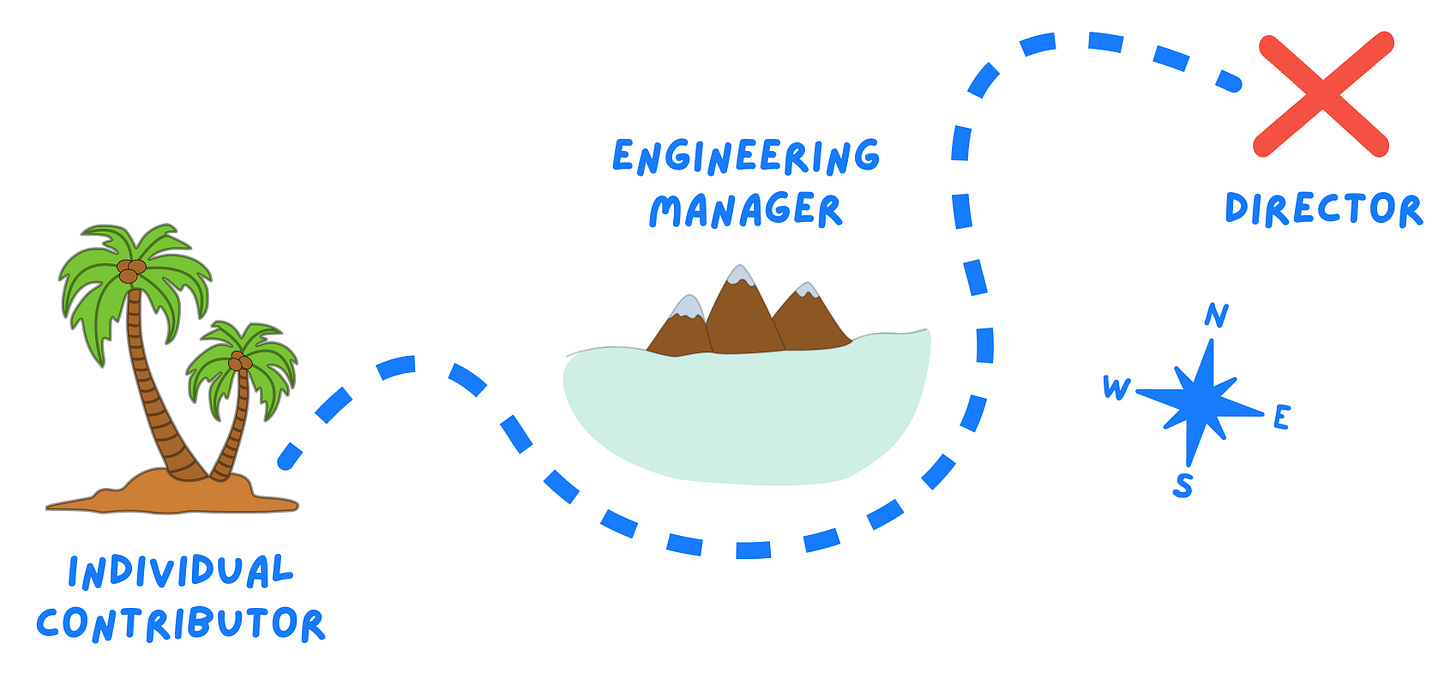From Engineer to Manager to Director 📈
A full, honest reflection on a decade-long career journey.
Last month I published a big guide about how you should navigate your career. This is the time of the year where many of us pause and reflect on their journey, so I thought this theme would be fitting.
And it was: it became our most popular piece of the year.
Still, even if it was a beefy, 3000-word piece, it left many hungry for more 😄 and I received a ton of questions about doubts and crossroads readers are finding themselves in.
So today’s article follows up on the same topic, but from another angle: it is a full case study on the personal journey of Nicola Ballotta, my partner in crime at Refactoring and Director of Engineering at Namecheap — the world’s second-largest domain registrar.
Nicola is incredibly humble about his achievements:
This isn't one of those fairy tales where, through hard work and following best practices, you land your dream job. It's simply my honest journey of moving from an individual contributor role to a director role. It's based on what I've learned from my own experience, and although each company may be different, the fundamental principles remain the same.
I believe ordinary stories are more common, and I hope my experience might be useful for others on the same path. So, I'll also share my takeaways from each phase and offer some suggestions based on what I've learned.
He is also completely honest about his challenges and lessons learned, which is what makes his story extremely valuable.
Here are the steps we are going to cover:
🌱 From Startups to Namecheap — how a failed project + good network landed a good job.
🪴 From Individual Contributor to Engineering Manager — navigating the shift in mindset and duties.
🌳 From Engineering Manager to Director — from managing engineers to managing managers.
For each step we are going to list challenges and lessons learned, and link these back to previous articles and ideas whenever possible!
So let's dive in, in Nicola’s own words! 👇
🌱 From Startups to Namecheap
Before landing at Namecheap, I owned an IT company in Italy and then a startup called wpXtreme, aiming to become the first integrated WordPress marketplace. Despite we were able to raise some funds, unfortunately the project failed for various reasons, but it left me with a good network of contacts.
One of these contacts, at one point, reached out asking if I knew someone who could help their company with building a WordPress Managed Hosting. Given my experience with the cloud, and my involvement with WordPress, I proposed myself instead of suggesting someone else. I made this move without thinking too much, and after a couple of interviews and a test project, I was hired at Namecheap.
My mission was to create the first prototype of what is now EasyWP — Namecheap's WordPress Managed Hosting that today counts thousands of customers. The idea was to build it on our own commodity hardware, not relying on public cloud providers, to make it affordable for everyone.
Though my official title was Product Owner, I dedicated a few months to building the first iteration of the product and the on-premise Cloud Infrastructure to host it, working under the direction of my new team leader and with the assistance of an experienced developer who was hired alongside me.
Challenges
Transitioning from being an entrepreneur to a full-time individual contributor role wasn't easy; for some time, it felt like a step back.
Starting to work for a large company like Namecheap, with its thousands of employees, was a different experience compared to a startup.
Luca’s note: this totally resonates. I felt the same when I left my startup for a Head of Engineering role. I wrote about this a couple of years ago.
Lessons Learned
🍻 Network matters — Maintaining a good network is one of the most valuable assets one can build during their life. For me, it was pivotal for landing this job.
🗺️ Connect the dots backwards — Life can be unpredictable. Sometimes, what seems like a step back (like transitioning from an entrepreneur to an individual contributor) is what you need to create an impressive career path.
🍀 Luck — a bit of luck and being in the right place at the right time counts.
🪴 From Individual Contributor to Engineering Manager
Once the product was launched publicly, we started getting customers and scaling really fast. This is where we also started hiring new people; the Cloud Team was born and I was promoted to the Engineering Manager position.
Despite my solid entrepreneurial experience, this was a completely new world for me and implied a big change in my duties.
While before I was the whole day (and nights) in front of my terminal with the code editor open, now I had to:





